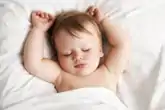Sleep
Sleep is the thing you do when you're not awake an altered state of consciousness where the body goes into a meditative state, muscle movement decreases and you tend to react less to your environment, like your alarm clock. It is unknown why sleep is needed, but some theories suggest that it is the main time that the brain organizes itself.[1] Having a brain however is not a prerequisite for sleep: it has been shown that some species of "upside-down jellyfish" (genus Cassiopea), which lack brains, enter a sleep-like state.[2][3]

| Live, reproduce, die Biology |
| Life as we know it |
|
| Divide and multiply |
| Greatest Great Apes |
|
v - t - e |
There are many disorders associated with sleep, such as falling sleep suddenly at inopportune times (narcolepsy), a lack of sleep (insomnia), and making an annoying noise and waking everyone around you (snoring; a more serious condition being sleep apnea).
I had a dream
Sleep is also where dreams occur, along with nightmares and lucid dreaming. Dreams are most vivid during REM (Rapid Eye Movement), where your muscles relax and the front part of your brain shuts down, which is why dreams are so bizzare. Dreams occur every night, but usually your brain forgets at least half of them by the time you wake up.[4]
Misconceptions about sleep
Sleep deprivation is considered a public health issue. One-third of U.S. adults report not getting enough sleep according to the CDC,[5] and sleep deprivation costs the U.S. $411 billion annually,[6] though other countries also are heavily negatively affected by it, and Japan may be even more disproportionately affected. Since there has been little attention paid to the research behind sleep (there aren't many studies discussion the sleep myths as opposed to obesity, smoking, and cancer risk), several sleeping myths have culminated.[7] One common myth is that adults need only five hours of sleep. A joint consensus from the National Sleep Foundation and American Academy of Sleep, however, recommends adults sleep 7-9 hours.[8][9] It is also false that the body can habituate or "adjust" to a lack of sleep;[10] while sleepiness is at the most noticeable for the first days of sleep deprivation, performance and ability to stay awake still deteriorates over sustained lack of sleep.
Tactics
Ways to avoid sleeping (health risks involved)
- Caffeine (even ingesting caffeine as long as 6 hours ago can affect your sleep).
- Alcohol
- Pain
- Allergies
- Procrastination
- Stress
- Second wind
- Overworking
- Expose yourself to a screen of any sort, especially if you're close to one. Bigger screens keep people awake more than smaller screens.[11] Since blue light has a reputation for having someone stay awake, lens with orange filters that filter blue light have been touted as sleep aid. These lenses, however, are not thoroughly tested for effectiveness, and they disregard that even bright light can interfere with sleepiness.
- Napping too long at day.
- Having sleep apnea or sleeping with someone who does.
Ways to fall asleep
- Take a placebo
- Sleeping regularly and at consistent times
- Dim lights before sleep
- Imagining relaxing scenery
- Sleep deprivation
- Exercise
See also
- Dream interpretation
- Fun:List of people who are tired
- Sleep paralysis
- Sleep-learning
References
- Facts about Sleep
- To test sleep, researchers don’t let sleeping jellyfish lie: Experiments suggest that upside-down jellyfish are the first brainless animals that snooze by Mariah Quintanilla (4:52pm, September 26, 2017) Science News.
- The Jellyfish Cassiopea Exhibits a Sleep-like State by Ravi D. Nath et al. (2017) Current Biology 27(19): p2984–2990.e3. DOI: http://dx.doi.org/10.1016/j.cub.2017.08.014.
- 'Cause everything is never as it seems…
- Centers for Disease Control.Short Sleep Duration Among US Adults. Retrieved June 3, 2019.
- Hafner, Marco, Martin Stepanek, Jirka Taylor, Wendy M. Troxel, and Christian Van Stolk, Why sleep matters — the economic costs of insufficient sleep: A cross-country comparative analysis. Santa Monica, CA: RAND Corporation, 2016. https://www.rand.org/pubs/research_reports/RR1791.html.
- R. Robbins, M.A. Grandner, O.M. Buxton, et al., Sleep myths: an expert-led study to identify false beliefs about sleep that impinge upon population..., Sleep Health: Journal of the National Sleep Foundation. https://doi.org/10.1016/j.sleh.2019.02.002
- National Sleep Foundation. National Sleep Foundation Recommends New Sleep Times
- Consensus Conference Panel, Recommended Amount of Sleep for a Healthy Adult: A Joint Consensus Statement of the American Academy of Sleep Medicine and Sleep Research Society, Sleep, Volume 38, Issue 6, 1 June 2015, Pages 843–844, https://doi.org/10.5665/sleep.4716
- Belenky G, Wesensten NJ, Thorne DR, et al. Patterns of performance degradation and restoration during sleep restriction and subsequent recovery: a sleep dose-response study.J Sleep Res. 2003;12(1):1–12.https://doi.org/10.1046/j.1365-2869.2003.00337.x.
- Beil, L. (July 4,2011). "In Eyes, a Clock Calibrated by Wavelengths of Light". The New York Times. Retrieved June 12, 2019.
You can help RationalWiki by expanding it.